Learn how to write a strategic planning RFP to attract the right consultant for your unique organization.
Have you decided to invest in strategic planning for your organization, but aren’t sure where to start?
Here at Funding for Good, we always recommend working with a consultant for strategic planning, rather than trying to go it alone. There are many reasons why hiring a strategic planning consultant benefits organizations, but saving time and money are among the top five.
The first step in finding a great consultant is writing a strategic planning RFP or request for proposals. In this article, we cover the basics of what a strategic planning RFP is and how to write one.
A well-crafted RPF can help you find the right consultant to best support your unique organization. Once your RFP is ready, our complete guide to strategic planning consultants explains how to select and work effectively with a consultant.
Are you ready to start the strategic planning process?
What is an RFP for a Strategic Planning Consultant?
A strategic planning RFP, or request for proposals, is a brief written document that details why an organization is undertaking strategic planning, outlines the project scope and requirements, and requests that consultants submit proposals to perform the work.
An RFP may be one of the first interactions a consultant has with your organization. So you’ll want to make sure the RFP gives the consultant insight into your organization, what you’re trying to accomplish, and how you work. You can convey this by including organizational background and thinking about what your RFP is communicating to consultants. For example, if you release a 20-page strategic planning RFP (which we don’t recommend), that will communicate a lot about how you operate and what it might be like to work together.
Remember, a consultant also wants to make sure they can provide a successful strategic planning process for your organization. A good strategic planning consultant will ask you plenty of questions during the application and selection process. If a consultant doesn’t ask questions, that would be a red flag that they’re not prepared to give your organization a more customized experience.
Read more: What to Expect When Selecting a Strategic Planning Facilitator
Why Do I Need a Strategic Planning RFP?
One of the greatest benefits of a strategic planning process is how it can create organizational alignment and buy-in. By writing a strategic planning RFP, you’re starting that alignment-building process from the very beginning.
Writing a strategic planning RFP will:
- Get your board and staff leadership on the same page. Knowing why you’re undertaking a strategic planning process is essential for ensuring it’s a success. If you don’t know what you’re trying to accomplish and why, how can a consultant help you meet those goals?
- Put your goals in writing. Even if your board and staff leadership are already on the same page about why you need a strategic plan, putting these reasons in writing eliminates future confusion. Everyone remembers conversations a little bit differently. Writing an RFP that’s been reviewed and approved by your organization’s board solidifies expectations.
- Engage your stakeholders. A strategic planning RFP is something you can share with your stakeholders—such as staff, volunteers, and donors—so they know what you’re doing and why. You’re also going to need those stakeholders on board when implementing your plan. The sooner you start your stakeholder engagement, the better.
Writing a Strategic Planning RFP that Gets Results
To attract the right consultant for your organization, your RFP needs to include several key elements.
1) Introduction and Summary
Like an executive summary, in 2-4 paragraphs, you’ll want to summarize what you’re seeking (a strategic planning consultant), why, and what you hope to accomplish.
If you’re not sure how to start, try answering the following questions:
- What kind of business or nonprofit is your organization? Be sure to mention what sector you work in, as well as the size and scope of your operations. You may want to find a strategic planning consultant who has experience with similar organizations.
- Why are you undertaking strategic planning now? For example, your organization may be experiencing a major change in your operating environment and trying to figure out how to respond and adapt. Or perhaps you’re a new organization and you want to create a strategic plan to increase your odds of success. It could be that you have a current strategic plan that ends in 12 months, so it’s time to start working on the new one.
- What are you hoping strategic planning will enable your organization to accomplish? If your organization is currently experiencing any specific challenges (internal or external) that you hope strategic planning can help you navigate, be sure to mention those. Also, consider organizational growth trajectories. Perhaps your organization is poised for growth (or contraction), and you want a strategic plan for how to do it smartly.
- What is your overall timeline? How many years will your strategic plan ideally cover (the standard is 3-5)? When do you hope to begin and/or finish the strategic planning process?
- Are you looking for anything specific in a consultant? For example, if you want a consultant who has worked with nonprofit organizations, mention that here. Organizations also increasingly include information about values and diversity in their RFPs.
Don’t be afraid to let your organization’s personality shine through when writing your introduction and summary. If your organizational culture is very serious, buttoned up, and structured, that’s how you’ll want your RFP to be too. If your organization places a high premium on creativity and playfulness, you can let that come out in your writing style.
2) Organization Background
You will want to provide basic information about your organization, including your vision and mission, size, sector, how long you’ve been operating, etc. You probably already have this information available on your website, grant proposals, annual reports, or other materials. Which means you don’t need to reinvent the wheel.
Keep your organization background to 2-3 paragraphs. Make sure to mention any major internal shifts your organization has undergone in its recent history. For example, perhaps 10 years ago your organization merged with another nonprofit in your region. If your mission has changed or expanded over the years, mention that too. For example, maybe your small business started as a grant writing consulting firm and has grown to encompass a range of other services.
3) Project Scope or “Who Are We Looking For?”
Here at Funding for Good, we recently saw an organization’s RFP that included a section called: “Who are we looking for?” This section included information about the organization’s values, how they envisioned working with a consultant, the type of experience they hoped a consultant would bring, and details about the project scope. This was a great way to keep the focus on what the organization was seeking in a consultant and the process overall, including which elements were most important to them.
When it comes to writing a project scope, focus on what matters. Describe the most important elements you want to include in your strategic plan and planning process. For example, do you want a consultant to:
- Use a tool like an environmental scan or SWOT analysis to assess internal and external challenges and opportunities.
- Facilitate stakeholder input, such as strategic planning stakeholder surveys and interviews.
- Organize and facilitate a strategic planning retreat for board and staff leadership.
- Guide the development of goals and outcomes development.
- Create implementation or operational plans. For nonprofits, you may want a consultant who can advise on fundraising plans as well.
To learn more about what’s included in a strategic plan and planning process—and identify which ones to include in your RFP—check out our article on Making Sense of Strategic Planning Resources and Tools. Our Guide to Nonprofit Strategic Planning also provides an overview of the planning process that can be helpful for both nonprofit and for-profit organizations.
Note that it is possible to become too detailed in laying out your project scope. You don’t want to include every single step of a potential strategic planning process. Remember, you’re seeking a strategic planning consultant not just to facilitate the process, but to bring their years of expertise to help your organization achieve the best results. Leave enough space for consultants to bring their insight, creativity, and wisdom to the process.
4) Timeline
If you have a set timeline in mind for your planning process, include that here. For example, do you want a 7-year strategic plan? Do you have a target date to begin the planning process and/or a date you need to have the strategic plan finalized? This information will help consultants assess whether they can fit your organization into their schedule.
5) Application and Selection Process
Just like applying to a college or a job, offering clarity about the application and selection process is helpful for both organizations and applicants. Creating a clear process upfront is also important when it comes to diversity.
Be sure to include submission deadlines as well as review timelines. You’ll also want to describe what you’re looking for in RFP responses. For example, do you expect a detailed cover letter and a proposal that’s no more than 10 pages? Or perhaps you want consultants to share which strategic planning model they propose to use and why. Or maybe you want information about a consultant’s background specifically in your sector or industry, along with referrals.
Regardless, include these sorts of details in your strategic planning RFP so consultants can provide the information you need to make a decision. Consultants aren’t mind readers, after all!
Read more: Strategic Planning Consultants – A Complete Guide
Finalizing Your Strategic Planning RFP
Once you’ve drafted your strategic planning RFP, you’ll want to treat it like any public-facing document. That means editing and proofreading. Because strategic planning is so important to an organization, you also want to be sure your board and staff leadership provide input and sign off on the final version. The last thing you want is to change your mind about organizational goals for strategic planning halfway through the consultant selection process.


